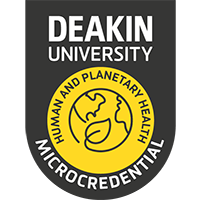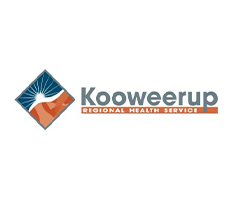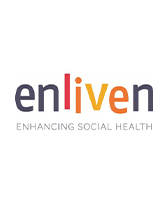Tools for a sustainable future
Gain an understanding of the interconnectedness of human and planetary health, why it is critically important for the health of humans and the environment, and how to work toward sustainable health outcomes that benefit both.
-
Start date
On-demand -
Duration
6 weeks -
Study mode
Online on-demand -
Investment
$1375 (inc. GST)
Job skills outcome
After completion of the course, you will be able to apply these skills immediately in your workplace.
- Analyse the challenges of climate change and environmental degradation for human health.
- Analyse the opportunities for integrating human and planetary health in health promotion initiatives.
- Develop and apply models for promoting health and addressing threats to the environment.
- Analyse needs, identify stakeholders and generate potential strategies to achieve sustainable ecological health outcomes.
- Propose and justify an evidence-based initiative addressing a priority health issue using an ecological health approach.
Earn a digital credential
We’ve teamed up with Credly to award you a digital credential when you complete this industry-recognised stackable short course, plus you can bank the credit towards a Deakin postgraduate degree. You can also share your digital credential on social and professional platforms.

Co-designed with industry
Together with industry, we’ve designed a short course where you’ll gain skills that you can apply immediately in your workplace.
Meet the experts
Dr Rebecca Patrick is Course Director, Master of Health Management, and Director, Sustainable Health Network at Deakin University.
Sue Noy is a Sessional Academic, Research Fellow and Member of the Health Nature Sustainability Research Group at Deakin’s Faculty of Health.
Teresa Capetola is Course Director, Master of Health Promotion and Lecturer, School of Health and Social Development at Deakin’s Faculty of Health. Teresa is Co-President of the Australian Health Promotion Association.
Jo Brown is Manager Health and Wellbeing at Southern Grampians and Glenelg Primary Care Partnership (SGGPCP), with a work focus on health promotion and climate change.
Georgia Langmaid is Planetary Health Project Officer at enliven Victoria, a health promoting charity that aims to improve health and social wellbeing for vulnerable groups.
Aileen Thoms is the Director of Primary Health and Innovation at the Kooweerup Regional Health Service, a public hospital caring for the health and wellbeing of local residents.
You’ll also meet a panel of Deakin experts who will share their perspectives on sustainability: Janine McBurnie (environmental management), Tom Keel (built environment) and Teresa Capetola (health promotion).
Meet the organisations
This industry-led stackable short course is co-designed with health organisations including Southern Grampians and Glenelg Primary Care Partnership, Koo Wee Rup Regional Health Service and enLiven.



Reshaping university education
An innovative learning structure delivered by a leading university. With more than 40 years’ experience in distance and online education, we’re proud to be adding this unique study format to our courses, providing you with more choice to further your career and fulfil your lifelong learning needs.
Course overview
How you'll learn
Go at your own pace with support from your educator and fellow learners during online learning activities and discussions. Complete your course within 6 weeks, including the assessment, or take extra time and use the regular assessment submission windows to complete within 24 weeks of your enrolment. During this time, you can book online consultation sessions with your educators to support your learning.
What you’ll learn
During the short course you’ll:
- learn about the relationship between human health and the environment, and the challenges and opportunities for promotion
- identify the principles for healthy, just and sustainable communities, including sustainable health paradigms and global mandates
- explore systems thinking and health, looking at interdisciplinary collaborations, and environment and social justice
- study the approaches to promoting human health and health of the environment, with a focus on the global food system and climate change
- learn to lead, design, plan and evaluate co-benefit initiatives using systems thinking tools and approaches.
How you’re assessed
Your assessment has two parts: first, a written report making a case for action on a health problem in a setting relevant to your practice. Second, a video presentation reflecting on your learning (total assessment equivalent 2500 words).
Entry requirements
To be successful we recommend you are proficient in English and have a minimum of an undergraduate degree in a related field or significant work experience.
I really enjoyed the short course and learned a lot – I’ve already developed a detailed project plan and steering group for my proposal at work. I now have more confidence and have achieved my professional development goal.
Susie
Promoting Human and Planetary Health short course
About enrolment
It takes five minutes to register your details and sign up for a stackable short course. We have discounts available for Deakin alumni, staff and group bookings. Enrol today and get the skills you need to take your career further, faster.
Stackable or standalone short course
Complete one stackable short course as a standalone credential, or stack multiple to build towards a full postgraduate degree at Deakin. Stackable short courses are affordable and help you to complete a postgraduate degree faster.
Recommended pathway to a related postgraduate degree
Learners who study this stackable short course also complete Change Tools
Postgraduate degrees you can apply stackable credit to
Unsure what degree you want to study? Study two stackable short courses that interest you and apply both as credit towards a wide range of postgraduate degrees at Deakin – from business administration to nursing, sustainability to communication, and more.
Other stackable short courses you can study at Deakin
If you're interested in this stackable short course, you may also like:
Got a question?
We've curated some of the most common questions students like you are asking about applications, entry requirements, fees and more.
Stackable short courses
Skip to next topicCan I gain credit towards a degree?
Yes. We offer fast, flexible and affordable online stackable short courses that give you the skills you need now, and are designed to stack together as credit towards a full Deakin postgraduate degree.
For more information on future student services and courses:
Do Deakin's short courses guarantee entry to a postgraduate degree?
You’ll still need to demonstrate that you meet the postgraduate degree entry requirements. Two stackable short courses are equivalent to one credit point.
For more information on future student services and courses:
How do I transition from a stackable short course to a graduate certificate or masters?
Contact us and we’ll provide you with instructions before you start the application process. You’ve already provided us with some of your details for the short course, but we will need a bit more information to support your application for a postgraduate course.
For more information on future student services and courses:
Do employers recognise Deakin's stackable short courses?
Deakin has undertaken extensive industry and labour market research to identify key in-demand skills and growth areas. Our short courses are co-designed with industry experts and partners, to meet your career goals and their employment needs.
For more information on future student services and courses:
How many stackable short courses can I study?
As many as you like! However there are limits on how many can be used for credit in specific degrees, which is outlined in the University Handbook. Typically, a maximum of four stackable short courses can be used as credit towards a masters and two stackable short courses towards graduate certificates and diplomas.
For more information on future student services and courses:
How do I qualify for credit?
When you enrol in a stackable short course, you’re registered in Deakin’s student management system. When you complete two stackable short courses (1 credit point), your credit is automatically applied when you apply for a related degree. Upon successful completion you’re issued with a digital credential, which you can use as evidence.
For more information on future student services and courses:
What if I only do one stackable short course, not two?
You can choose to do one stackable short course, developing in-demand skills for your employment now and with the option to ladder your study into a formal qualification in the future. Completing one course means you’re not eligible for credit towards a related destination degree – you need to complete two for credit.
For more information on future student services and courses:
Do you have to do two stackable short courses in one year?
No. You can complete the stackable short courses at any time, even if you're completing them as part of a related degree, as long as you complete two before you are eligible to graduate (when you're enrolled in an award course).
For more information on future student services and courses:
Will the 10-year rule apply to stackable short courses?
Yes. Where you want to use the stackable short course as credit, the 10-year rule will apply. Your application will be assessed if your qualifications were completed within the last 10 years. The rule exists to ensure learning and job skills maintain relevance.
For more information on future student services and courses:
Will recognition of prior learning apply to courses that have 'university-wide' elective choice?
Yes. If there is non-specified credit then stackable short course credit can be used. Limits on elective space in a destination degree are outlined in specific degrees’ course rules within the University Handbook.
For more information on future student services and courses:
Are there any assessments?
Yes. Each stackable short course contains an assessment. The assessment may be completed during learning or submitted within 4 weeks of the final masterclass, or up to 24 weeks if you’re studying an on-demand stackable short course.
For more information on future student services and courses:
What are the assessments?
Assessments take the form of a presentation, written report or development task. Head to the course overview section to find out what you’ll be asked to submit.
For more information on future student services and courses:
Are the stackable short course masterclasses on weekends or during the week?
Masterclasses will be scheduled as a mix of weekend and weekday evenings. Details are provided in each stackable short course description. Some may run over 4 to 6 weeks, others may be an intensive single weekend offering. Please note that for on-demand courses you can log in anytime and finish within 20 to 26 weeks.
For more information on future student services and courses:
Do I have to attend all masterclass sessions and complete the assessment?
Yes. To be eligible for credit, you must achieve a Certificate of Completion. This means you will have to attend all sessions and pass the assessment for each masterclass. If there are special considerations that arise during your study, please speak with the course presenter or send an email to the stackable learning team.
For more information on future student services and courses:
What is the difference between masterclass and on-demand stackable short courses?
A masterclass is delivered live by an industry expert so you must attend on the specific dates to participate.
Whereas on-demand study mode means you can log in anytime and finish when you want within the allocated timeframe of 20 to 26 weeks. Optional online live sessions are provided on rotation approximately every 6 weeks.
For more information on future student services and courses:
Are masterclasses face-to-face or online?
All masterclasses are offered as online sessions. Full details are provided on each stackable short course masterclass page in the How you’ll learn section.
For more information on future student services and courses:
Do I need to purchase textbooks or any materials?
No. All materials are provided as part of the stackable short course.
For more information on future student services and courses:
Do I become a student of Deakin University?
You become a microcredential learner of Deakin University. You’ll be enrolled, receive a Student ID, and gain access to student systems and support during your study. As a part of the Deakin community, you’ll also be required to accept the Terms and Conditions of a microcredential learner.
For more information on future student services and courses:
Are any discounts available?
A 10 percent discount is available to Deakin Alumni and 20 percent for staff. We also offer discounts for group bookings; 10 percent for groups of three to nine students, 20 percent for 10–29 students, and 30 percent for groups of 30 or more. For full details, email stackablelearning@deakin.edu.au
For more information on future student services and courses:
What do I need to validate my eligibility for a discount?
If you register for an alumni or staff discount, you'll need to provide requested details to validate (check your ticket for more information). If your status cannot be validated within seven days, you’ll be removed from the course until you can validate or pay the outstanding amount.
For more information on future student services and courses:
Is Fee-HELP available?
No. You will need to make full payment upfront.
For more information on future student services and courses:
What is the refund policy?
For on-demand short courses you’ll have 7 days from purchase to apply for a refund. For masterclasses, let us know 30 days beforehand for a full refund. Cancellations within 30 days but at least 10 days from commencement will receive a 50% refund. Cancellations within 10 days of commencement will receive no refund. If we cancel, a full refund will be provided.
For more information on future student services and courses:
Are there specific entry requirements or prerequisites for international students?
No. However, you need to meet the recommended experience and English language requirements listed on the course page to ensure you can be successful.
For more information on future student services and courses:
What is the global standing of Deakin's stackable short courses?
In the digital badge, credit points are specified using the European Credit Transfer and Accumulation System (ECTS). Each microcredential is worth 3.75 points in the ECTS.
For more information on future student services and courses:
Contact us
Talk to us
We're here to help. Our friendly advisers are available to speak to you one-on-one.
Chat online
Need more information right now? Chat with one of our expert study advisers online.
Ask a question
If you have a question about this course, submit your details and we'll be in touch.
Footnotes
*Subject to successful completion of the short course and meeting Deakin’s award course admission and selection requirements, including English language proficiency requirements.
Limits on elective space in a destination degree are outlined in specific degrees’ course rules within the Deakin University Handbook. Typically, a maximum of four stackable short courses can be used as credit (2 credit points) towards a masters; and two stackable short courses can be used as credit (1 credit point) towards graduate certificates and diplomas.
